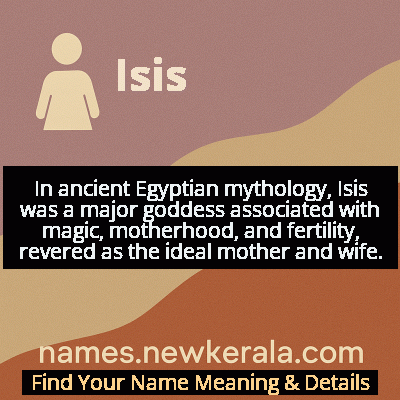Isis Name Meaning & Details
Origin, Popularity, Numerology Analysis & Name Meaning of Isis
Discover the origin, meaning, and cultural significance of the name ISIS. Delve into its historical roots and explore the lasting impact it has had on communities and traditions.
Name
Isis
Gender
Female
Origin
Egyptian
Lucky Number
2
Meaning of the Name - Isis
In ancient Egyptian mythology, Isis was a major goddess associated with magic, motherhood, and fertility, revered as the ideal mother and wife.
Isis - Complete Numerology Analysis
Your Numerology Number
Based on Pythagorean Numerology System
Ruling Planet
Moon
Positive Nature
Diplomatic, friendly, artistic, empathetic.
Negative Traits
Over-sensitive, moody, indecisive, prone to self-pity.
Lucky Colours
Green, cream, white.
Lucky Days
Monday.
Lucky Stones
Pearl, moonstone.
Harmony Numbers
1, 3, 4.
Best Suited Professions
Diplomats, mediators, caregivers, artists.
What People Like About You
Cooperative spirit, friendliness, artistic talent.
Famous People Named Isis
Isis King
Reality TV Star and Model
First transgender contestant on America's Next Top Model and LGBTQ+ advocate
Isis Gee
Singer and Songwriter
Represented Poland in Eurovision Song Contest 2008 with song 'For Life'
Isis Valverde
Actress
Award-winning Brazilian actress known for telenovelas and film roles
Isis Gaston
Musician
Lead vocalist of American rock band Smile Empty Soul
Name Variations & International Equivalents
Click on blue names to explore their detailed meanings. Gray names with will be available soon.
Cultural & Historical Significance
In Roman times, the cult of Isis became one of the most popular mystery religions, attracting followers from all social classes. Her worship involved elaborate rituals, processions, and initiation ceremonies that promised personal salvation and communion with the divine. The Isis cult was notable for its inclusion of women in prominent religious roles and its appeal across cultural boundaries. Archaeological evidence of Isis worship has been found throughout the Roman Empire, from London to the Black Sea, demonstrating her widespread appeal. The goddess's attributes were sometimes syncretized with other deities, creating composite figures like Isis-Aphrodite or Isis-Demeter, showing her adaptability across different cultural contexts.
Extended Personality Analysis
Individuals named Isis are often perceived as nurturing, intuitive, and spiritually inclined, reflecting the goddess's maternal and magical attributes. They tend to be protective of loved ones, displaying strong family loyalty and emotional intelligence. Many exhibit healing qualities, whether through traditional caregiving roles or alternative therapeutic practices. Their connection to the ancient goddess often gives them a sense of historical continuity and cultural depth. These individuals frequently demonstrate resilience in adversity, mirroring Isis's determination in reassembling and reviving Osiris.
People with this name often possess a mysterious quality that draws others to them, combined with practical wisdom in navigating life's challenges. Their intuitive nature makes them excellent judges of character and situations. They may be drawn to mystical or esoteric studies, reflecting Isis's domain over magic and hidden knowledge. Despite their spiritual inclinations, they typically maintain strong grounding in practical matters, balancing mystical insight with real-world effectiveness. The name carries an expectation of strength and dignity, often leading these individuals to develop a regal bearing and commanding presence that inspires confidence in others. Their combination of nurturing warmth and formidable capability makes them natural leaders in family and community contexts.
Modern Usage & Popularity
The name Isis experienced moderate popularity in Western countries during the late 20th and early 21st centuries, particularly among parents drawn to Egyptian mythology and unique names. However, usage declined significantly after the rise of the terrorist organization ISIS (Islamic State of Iraq and Syria) in 2014. According to Social Security Administration data in the United States, the name dropped from ranking 2,756 in 2013 to completely falling off the top 1,000 names by 2015. Many parents who had named daughters Isis reported negative experiences, including bullying and awkward social situations, and some even pursued legal name changes. Current usage is primarily among families with strong connections to Egyptian heritage or those determined to reclaim the name's positive mythological origins. The name remains more common in Latin American countries like Brazil and among communities where the terrorist association is less prominent. Despite the modern challenges, some activists and name enthusiasts continue to advocate for separating the ancient goddess from contemporary geopolitical issues, though the name's popularity has not recovered to pre-2014 levels.
Symbolic & Spiritual Meanings
The name Isis symbolizes feminine power, magical transformation, and eternal love. It represents the archetype of the devoted mother and faithful wife who overcomes tremendous obstacles through wisdom and perseverance. Symbolically, Isis embodies the power of resurrection and renewal, as demonstrated in the Osiris myth where she pieces together her husband's dismembered body and temporarily restores him to life. The throne hieroglyph in her name connects her to royal authority and legitimate power, representing both her role as queen and her function as the embodiment of the pharaoh's divine right to rule. She represents the intersection of magic and practical wisdom, showing how mystical knowledge can be applied to solve real-world problems. The wings often depicted with Isis symbolize protection, maternal care, and the ability to transcend boundaries between worlds. Her association with the star Sirius connects her to cosmic cycles, navigation, and the promise of rebirth after darkness, as Sirius's heliacal rising marked the Nile's annual flooding and the Egyptian new year.

